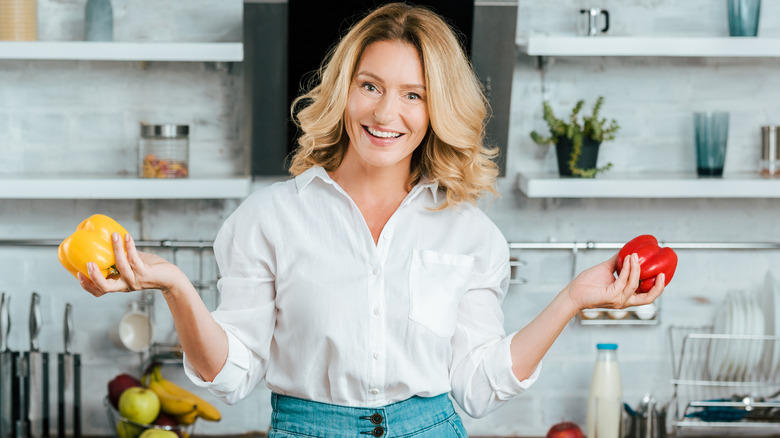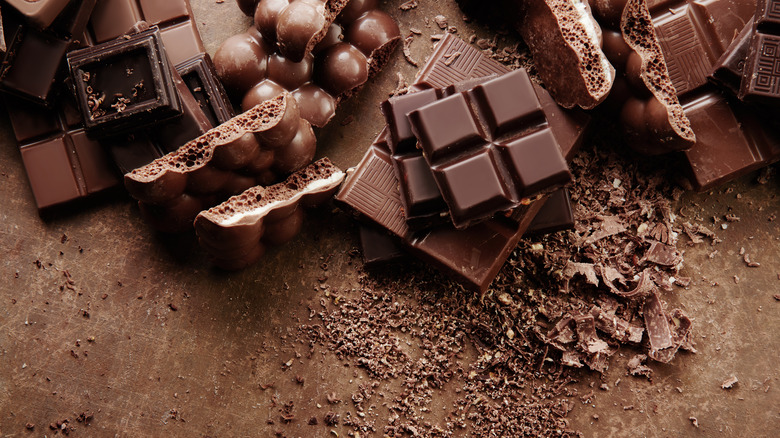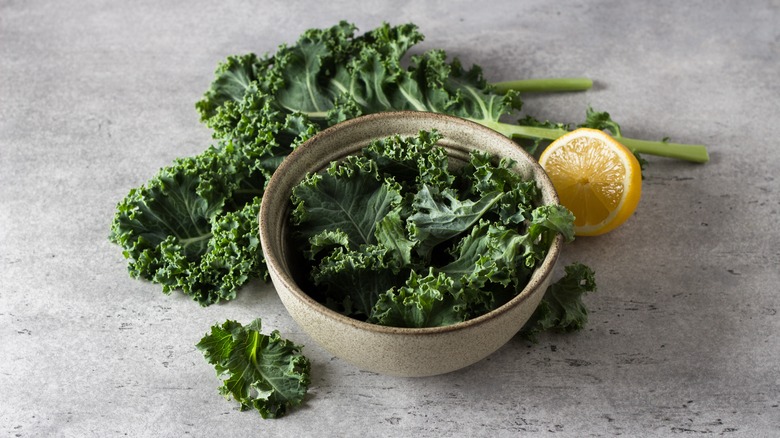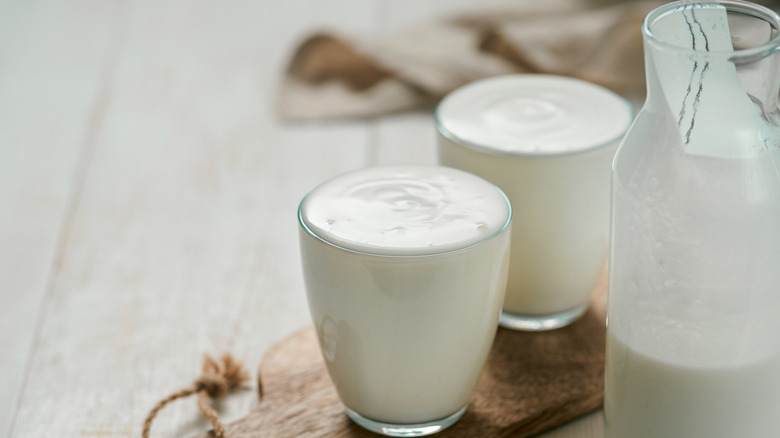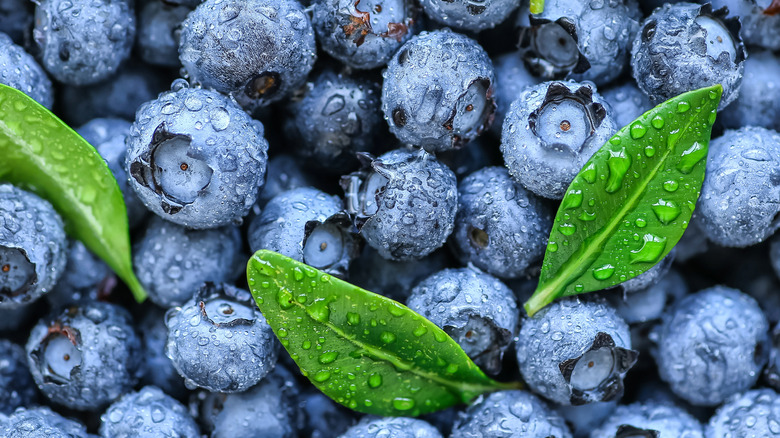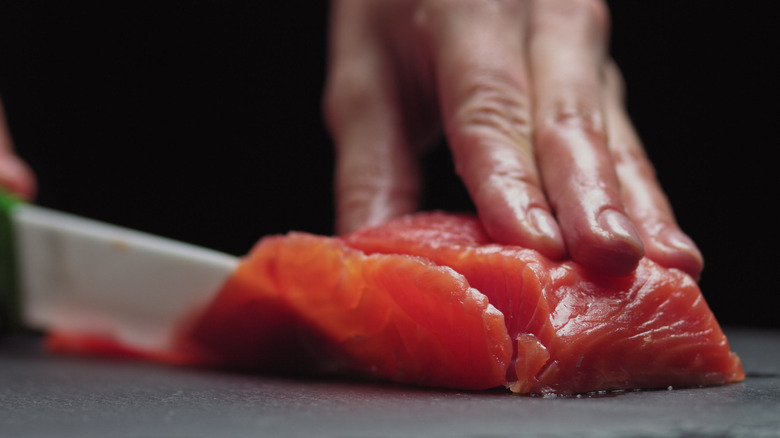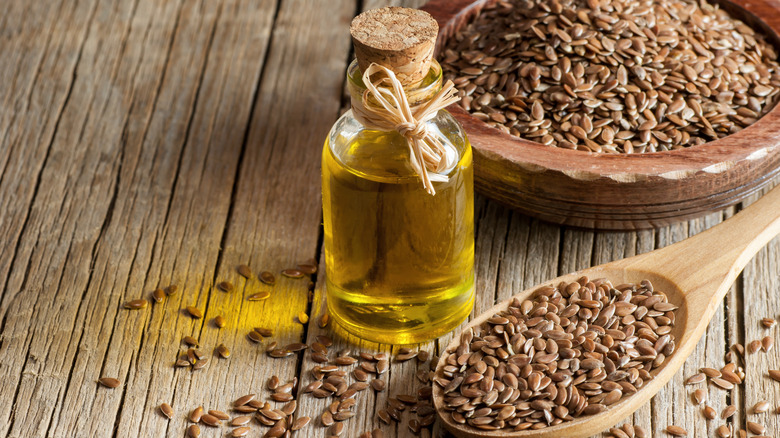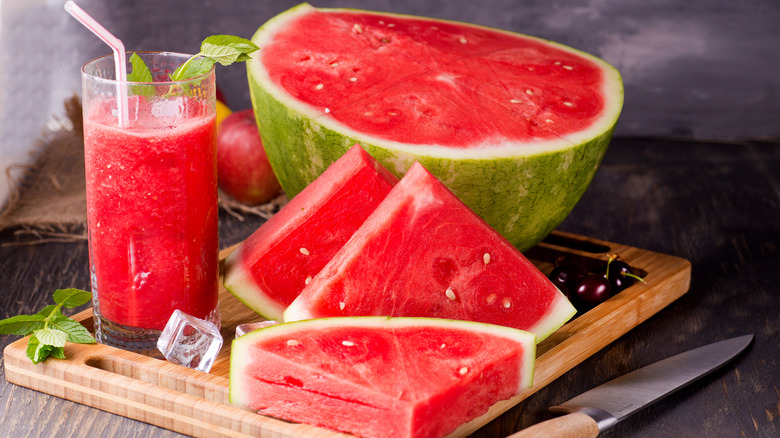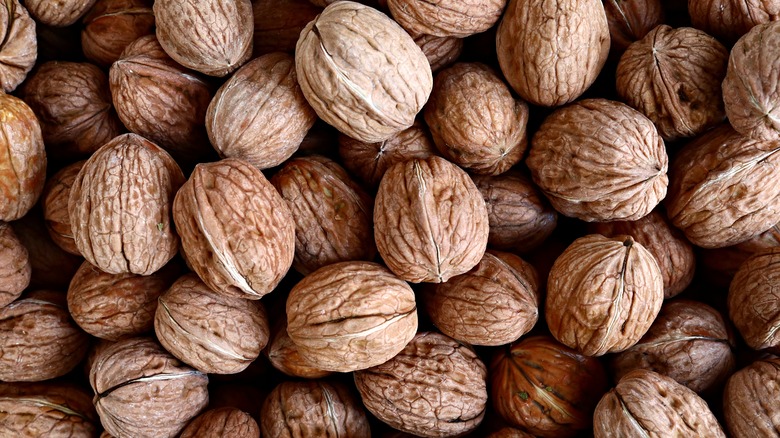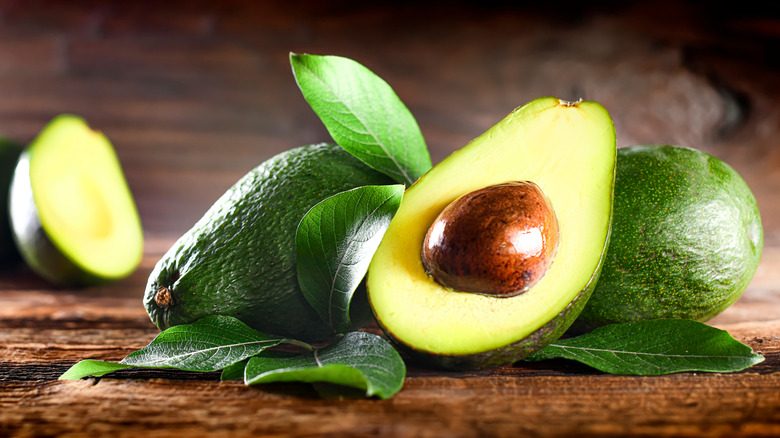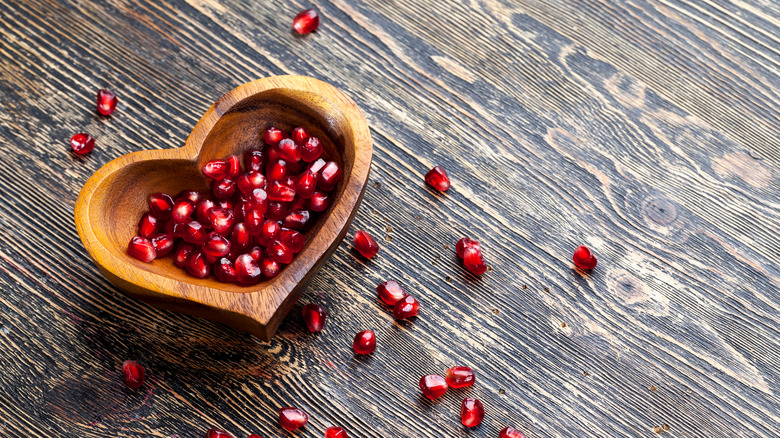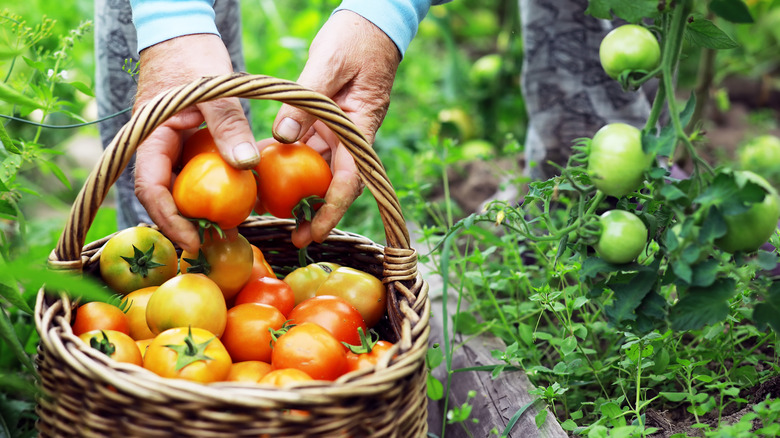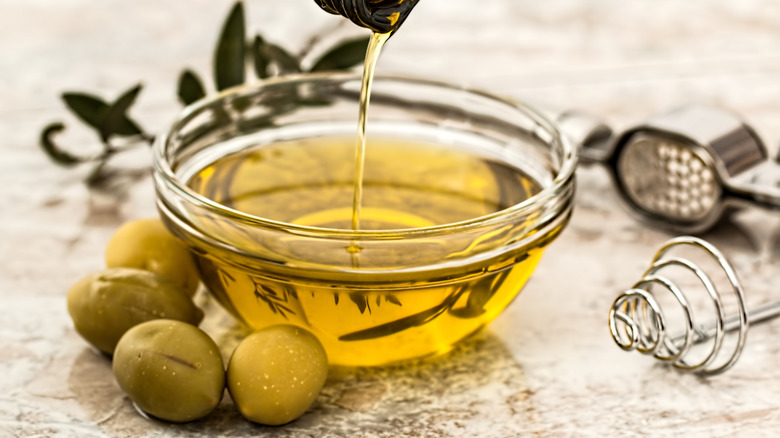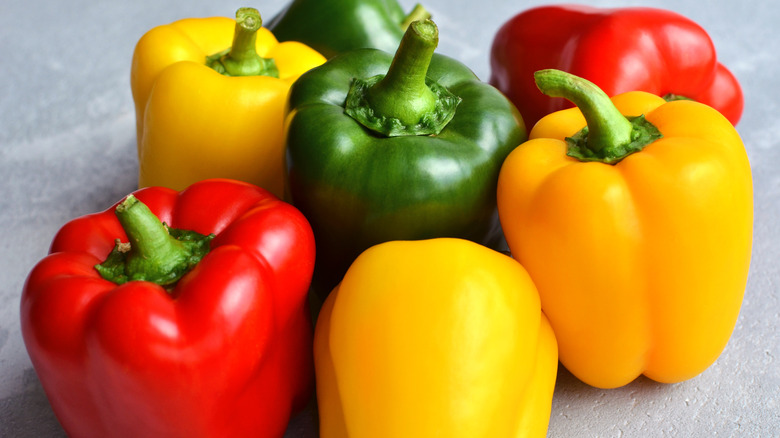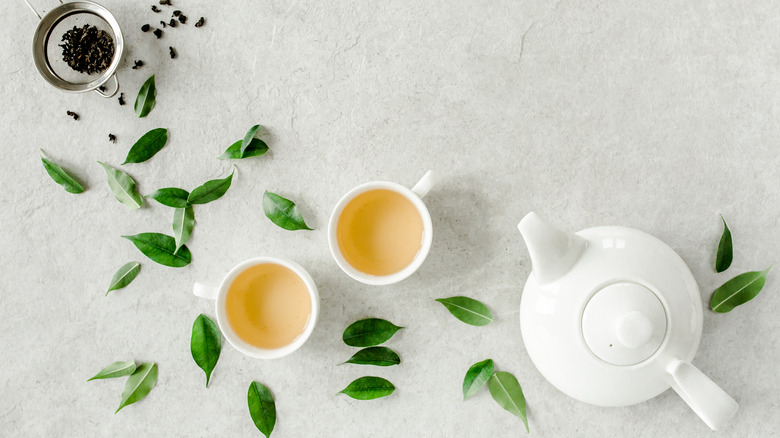Foods That Will Actually Make You Look Younger
It seems like everyone is seeking a magical elixir to preserve their youth. You may research and implement lengthy and expensive skincare routines into your busy life. Many of us try to work out, eat right, look our best, and, occasionally, lie about our age (shh). While some of these actions truly do make us feel happier and more confident from the inside out, other habits are borne out of a desire to preserve our youth — or at least, the appearance of it — for as long as humanly possible.
However, a youthful appearance often goes deeper than just buying the right products. A healthy diet is key. Many vitamins and minerals in fruits, veggies, and other foods are responsible for a healthful, youthful glow. To be clear, eating these foods alone won't create a Benjamin Button situation for you. Still, they can aid in your journey to healthy, gentle, and graceful aging (per Healthline).
Dark chocolate
The natural favorite anti-aging food is dark chocolate, of course. Not only do you get to indulge a bit when you have a bite, but doing so actually has health benefits that can have you looking younger. Dark chocolate provides iron, magnesium, manganese, copper, and antioxidants — all of which have huge health benefits. Most notably, the antioxidant profile in dark chocolate gets credit for the youth-promoting benefits (via Healthline).
Blueberries and acai berries have long been known to contain impressive amounts of antioxidants. Still, one study cited by Healthline showed that dark chocolate has even more antioxidants than those super-berries. Antioxidants are the compound that wage war against the harmful free radicals in your body. Free radicals are produced naturally, but pollution, chemicals, smoking, and other factors can lead to an abundance of them. Excessive free radical activity has been linked to aging, so consuming more antioxidants to fight them can help you look and feel better (Medical News Today).
Dark chocolate may also improve blood flow and aid in cholesterol regulation. While studies are ongoing, evidence shows that consuming dark chocolate may help with cognitive function. Additionally, it may help protect your skin from the harmful UV rays of the sun and maybe even reduce your risk of heart disease. Experts recommend enjoying dark chocolate in moderation and also advise opting for a 70% or higher cocoa content for optimal health benefits (via Healthline).
Kale
We get it — kale has to be one of the least sexy foods out there. Plus, it seems like every healthy person touts the benefits of this tough, bitter roughage. Nevertheless, kale does live up to the hype. In fact, it is one of the most nutrient-dense superfoods on the planet.
Just 1 cup of raw kale includes a host of vitamins and minerals, such as vitamin A, vitamin C, magnesium, manganese, potassium, vitamin K, and more, according to Healthline. Vitamin C is pertinent when it comes to assisting your body with collagen production. Collagen is a structural protein that helps maintain plump, healthy skin and connective tissues. A cup of kale serves up a whopping helping of free radical-destroying antioxidants, a huge plus when it comes to helping us stay young-looking.
More unpredictably, though, kale contains a small amount of fat in the form of an omega-3 fatty acid called alpha-linolenic acid. Omega-3 fatty acids can help regulate cholesterol, which may reduce your risk of developing heart disease (via Healthline). So it is possible that kale can keep you young-ish from the inside out.
Probiotics
While it isn't always fun to talk about bacteria, some bacteria can actually benefit us. Specifically, probiotic bacteria can help delay some of the physical signs of aging.
Probiotics generally arise as a result of bacterial fermentation. According to Healthline, they are abundant in fermented foods such as kimchi, sauerkraut, kefir, yogurt, and tempeh. In a review published in the Journal of Drugs in Dermatology, researchers came to some uplifting conclusions. They found that probiotics "restore acidic skin pH, alleviate oxidative stress, attenuate photoaging, improve skin barrier function, and enhance hair quality." Because probiotics can help diminish the external skin effects of oxidative stress, they can encourage a more youthful appearance.
One study published in the British Journal of Dermatology even concluded that probiotics can influence the amount of ultraviolet light damage on the skin's surface. The probiotics helped decrease the amount of newly-developed inflammatory cells that were present on the skin's surface.
Blueberries
Blueberries have long been regarded as a healthy superfood that is stacked with antioxidants. And as we now know, those antioxidants are one of the best ways to combat the free radicals that can accumulate and mess with our delicate homeostasis. Specifically, the antioxidants in blueberries can help combat some of the physical signs of premature aging. Blueberries are also high in vitamins and minerals that may help promote collagen production, a necessary component for maintaining the youthful plumpness of our skin (via Healthline).
Some of the compounds present in blueberries can even improve your circulation. An improvement in circulation means that your blood can carry more nutrients more efficiently throughout your body. The result is cells that turnover faster, including skin cells. The newer the skin cells on your face, the fresher you look. While research is ongoing, much of the current evidence suggests that consuming blueberries can help reduce many inflammatory skin conditions, including eczema, psoriasis, and acne.
According to Healthline, some companies are researching blueberries and the anthocyanin they contain as a topical skin product that can expedite wound healing and act as an anti-aging serum.
Fish
Fish is another über-healthy food loaded with protein and other elements that we need to keep your complexions glowing and youthful. Many types contain an ample amount of vitamin D and heart-healthy omega-3s. Omega-3 fatty acids do more than just help balance your good cholesterol with the bad. They also help your brain to function properly and have been associated with a decrease in the incidence of some life-threatening diseases (via Healthline). Selenium, a trace element, is found in small amounts in many types of fish and may help prevent sun damage from UV rays
Fatty fish, in particular, can spell success when it comes to maintaining the integrity and youthful texture of your skin. Salmon is one of the most abundant and healthy fish for consumption (via Healthline). In one study, researchers found that a combination of collagen and astaxanthin, a carotenoid found in salmon, led to noticeable improvements in skin elasticity and hydration. While it is true that they combined compounds to achieve these results, the findings were incredibly notable. So, who is up for some sushi?
Flax seeds
Flax seeds really pack a punch when it comes to youth-promoting side effects. Perhaps it is time to get creative in adding them to our diets. According to Healthline, flax seeds are one of the oldest crops known to humankind. Like fish, they contain omega-3 fatty acids, which "support a healthy skin membrane by helping your skin stay hydrated and plump," Healthline explained.
Though flax seeds contain small amounts of a plethora of necessary vitamins, their title as a "superfood" is mostly attributed to the omega-3s, fiber, and lignans they contain. Lignans are polyphenols that are found in many plant-food sources. They are thought to help inhibit the growth of certain types of cancer cells within the human body (per Healthline). Flax seeds and the elements they contain are also thought to help regulate blood sugar levels and assist in promoting feelings of satiety, which is beneficial when it comes to weight loss endeavors.
It is important to note that ground flax seeds offer the most benefits, according to Healthline. Flaxseed oil offers some benefits, but since oil is so sensitive to heat and light, consuming flax in oil form won't be your best bet if you are banking on the internal and external youth-inducing health benefits of the stuff.
Watermelon
Watermelon is a summertime favorite that Harry Styles somehow made universally sexy in 2019 by repetitively singing "watermelon sugar high, watermelon sugar high." And even though his lyrics claim that watermelon tastes like strawberries, one of those fruits reigns superior when it comes to youthful benefits. Korean skin care products have been using watermelon in its glow-inducing formulations for years, and it seems like many other skin care gurus are finally getting the memo.
In an exclusive interview with Elle, dermatologist and dermatologic surgeon Tiffany Jow Libby explained that watermelon contains a few choice vitamins that can illuminate your skin. These vitamins include vitamin A, vitamin C, and vitamin E. Not only do these vitamins help reduce inflammation when applied topically, but they can also help reduce the free radical damage that may be dancing its way across the sensitive skin of your face. What's more, each part of the watermelon has a slightly different chemical makeup and can be employed in different ways — from a redness reducer to a protein-infused skin-plumping serum. Zero-waste lovers rejoice because the entire watermelon can be used!
Because watermelon is made up of around 90% water, it is incredibly hydrating when applied to thirsty skin. Dr. Libby even states that you might be able to see the effects of increased surface hydration within seconds of application. However, true cell turnover and results may take closer to around a month to surface.
Walnuts
Walnuts have often been regarded as a super nut because of their cancer-fighting, health-promoting qualities. These little brain-shaped nuts have long been known to help with cholesterol management, weight management and provide a host of other health benefits (via World Health). But as of late, studies showing a link between a diet that includes walnuts and plant-based foods containing polyphenols can aid in the reduction of inflammation.
There are over 8,000 different polyphenols, which are various antioxidants that aid in keeping your body healthy, according to Healthline. While many studies have been conducted on mice, the results look promising for the potential effects they could have on humans when it comes to anti-aging (via World Health).
Inflammation can lead to a plethora of health problems, many of which increase the free radical activity in the body. Consuming foods that are high in compounds that fight free radicals, like walnuts, can help us look and feel our best, per Healthline.
Avocados
Californians, rejoice! The state's highly versatile fruit, the avocado, can help us maintain our youthful appearances. The skin's aging process is fraught with variables, but ultimately our skin ages in two ways: "chronological aging" (which is to say that as we get older, our skin does too) and "photoaging" (which is loosely defined as premature aging that occurs due to exposure to UV rays, according to a report in Nutrients.
Research regarding how diet influences skin health is underway, but the fat content of avos is thought to help improve the health of the skin membrane. Avocados contain high amounts of monounsaturated fats, which are thought to positively impact skin health when consumed, according to Healthline. They also contain antioxidants, which is a common thread among many youth-promoting foods. One study even observed that the skin condition of older adults was better among those who consumed healthy fats than those who did so only sparingly.
Pomegranates
Oh, how we love a pomegranate! Their plump, juicy little seeds are so vibrant and delicious. The sheer amount of effort it takes to extract the arils makes them as precious as diamonds in fruit form, in our humble opinion.
Pomegranates are believed to be one of the healthiest fruits on earth, as they contain fiber, protein, vitamin C, vitamin k, folate, and potassium (via Healthline). In addition to these compounds, pomegranates contain two others that are thought to be the true powerhouses when it comes to promoting health and a youthful appearance. Punicalagins, antioxidants found in the juice and peel of the pomegranate, are the reigning champs for providing free-radical-fighting benefits. In fact, experts believe that the antioxidant effects of the punicalagins are three times as powerful as those in green tea, as explained by Healthline. Punicic acid is the main fatty acid that can be found in the arils. It is a type of conjugated linoleic acid that has been associated with longevity and health.
Tomatoes
You could probably guess that tomatoes are healthy. After all, they are varied and rich in color. Tomatoes contain many different compounds that can provide health and youth-promoting benefits. However, the lycopene they contain is unique and especially beneficial (via Healthline).
Lycopene is often found in red and pink fruits. It is known to be an incredibly powerful antioxidant and provides cancer-fighting and heart-healthy benefits as well. Lycopene is most abundantly found in tomatoes, so they are touted for their anti-aging benefits (via Refinery29). One of the main effects of lycopene is on the skin's surface. Lycopene-specific studies have concluded that it can protect the skin from some UV damage when ingested. The studies mostly determined that lycopene offers the most protection when combined with carotenoids, a similar health-promoting compound.
Researchers are quick to warn that eating tomatoes alone isn't a great form of skin protection but that consuming them is a great way to reduce oxidative stress within your body, as a study in Antioxidants demonstrated. Fortunately, eating tomatoes and the lycopene they contain is a great way to help keep your complexion youthful.
Olive oil
A spoonful of olive oil may just be a surefire way to maintain a youthful glow — no doubt one of the many reasons the Mediterranean diet is beloved by many. Olive oil comes in a few different varieties, but experts generally agree that extra virgin olive oil is the way to go as it is minimally processed, according to Healthline.
The common trend among foods that can help you look younger is their antioxidant profiles, and extra virgin olive oil is no exception. The pure oil extracted from the olives contains antioxidants, which predictably combats much of the damage done by free radicals in their many forms. Some of the fatty acids in olive oil can help fend off inflammation and its subsequent diseases and complications (via Healthline).
Olive oil also contains vitamins E and K, which can keep your skin moisturized, less damaged, and radiant, per Healthline.
Bell peppers (and other collagen-aiding foods)
Collagen has always been a thing, but only recently has it been thrust into the limelight because of its complexion-balancing and plumping benefits. Collagen is a protein that exists within your body — about a third of the protein in your body is collagen, according to Healthline. "You can think of it as the 'glue' that holds all these things together," the site explained. "In fact, the word comes from the Greek word 'kólla,' which means glue."
The amount of collagen your body produces decreases with age, which contributes to the overall look of saggy, less robust skin. Consuming collagen may not slow the decline of production, but ensuring that you are consuming enough of the components that help your body produce collagen can help (via Healthline). Vitamin C, proline, copper, and glycine all come together to aid in collagen production. By consuming foods that contain these elements, you'll be a step ahead of the curve when it comes to preserving those youthful good looks.
Vitamin C is a popular choice — and one that is plentiful in citrus fruits and some vegetables, like bell peppers. Proline is most abundantly found in egg whites, some mushrooms, and cabbage. Glycine is most often found in the skin of animal meats but is also available from other protein sources. Finally, copper is best consumed through lentils, organ meats, cashews, cocoa powder, and sesame seeds (via Healthline).
Green tea
Green tea is a popular kind of tea that is well known for its anti-aging antioxidants and other medicinal properties. Not only do the antioxidants in green tea fight the free radical damage on your skin, like so many other of our favorite anti-aging foods, but drinking green tea has been associated with a lowered risk of cancer and heart disease. The antioxidant profile of green tea will benefit your skin, while the healthful components it contains may increase your longevity, according to Healthline.
Drinking green tea may also aid in fat loss and improve brain function, which will help ensure your insides match your oh-so-young-looking outsides. The polyphenols present in green tea also help reduce inflammation, which as we know has huge aesthetic benefits and disease-fighting powers. If you want youthful-looking skin but aren't a fan of the taste of green tea, know that drinking it is not the only way to reap its benefits. "Drinking green tea and applying it to your skin can help your skin handle the aging process better," Healthline explained.

